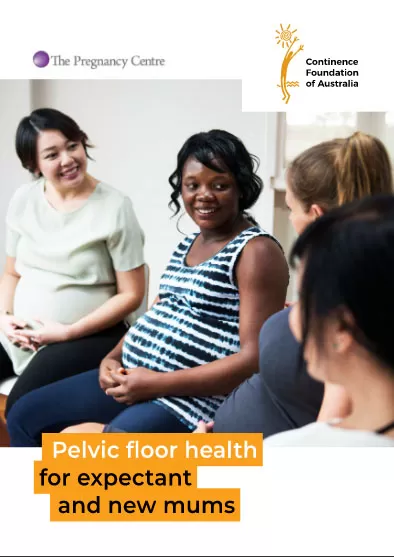PREGNANCY, childbirth AND inCONTINENCE
One in three women who ever had a baby wet themselves
The following video answers the question about why women have an increased risk of leaking urine (wee) after childbirth. The video also provides information on pelvic floor exercises, good bladder and bowel habits and where to go for help in a simple and easy to understand manner.
Produced Continence Health Australia in association with Jean Hailes for Women's Health. Based on the One in three women who ever had a baby wet themselves booklet developed by the National Continence Program, an Australian Government initiative.
COMMON QUESTIONS
Many bladder and bowel problems, particularly during pregnancy, can be due to weak pelvic floor muscles. If you have weak pelvic floor muscles you may:
- leak urine when you cough, sneeze, lift, laugh or do exercise (stress incontinence)
- not be able to control passing wind
- feel an urgent need to empty your bladder or bowel (urge incontinence)
- leak bowel motion after you have been to the toilet
- have trouble cleaning yourself after a bowel motion
- find it hard to pass a bowel motion (constipation)
- feel a lump in your vagina or a sensation of dragging (mostly at the end of the day), which could mean that one or more of your pelvic organs might be sagging down into your vagina (pelvic organ prolapse).
Some women may be more likely to have bladder and bowel problems, even if they have had an easy birth. We don't know who these women will be.
Women who already have bladder or bowel symptoms, such as irritable bowel syndrome or an urgent need to pass urine (also called overactive bladder) may be more likely to have this problem worsen or to gain new problems.
Certain things about the birth that can make a woman more likely to have bladder and bowel problems including:
- having a large baby
- having a long labour, particularly during the second (pushing) stage of labour
- having a difficult vaginal delivery, when you have stitches or a tear just outside your vagina.
Choosing a caesarean birth might seem like a way to avoid these problems, but it is not that simple. A caesarean birth might reduce the risk of severe bladder control problems from 10% to 5% for a first baby, but after the third caesarean there may be no benefit at all.
The birth of your baby might have stretched your pelvic floor muscles. Any 'pushing down' action in the first weeks after the baby's birth might stretch the pelvic floor again. You can help to protect your pelvic floor muscles by not pushing down on your pelvic floor. Here are a few ideas to help you:
- try to squeeze, lift and hold your pelvic floor muscles before you sneeze, cough, blow your nose or lift
- cross your legs and squeeze them tightly together before each cough or sneeze
- share the lifting of heavy loads
- don't do bouncing exercises, and
- do pelvic floor muscle training to strengthen your pelvic floor muscles.
Read more about pelvic floor muscle exercises for women.
Bladder or bowel control problems just after giving birth will often improve in the first six months, as the pelvic floor tissues, muscles and nerves recover.
Regular pelvic floor muscle training kept up over the long term, as well as the right advice will help.
Don't forget to look after yourself at a time when it is easy to neglect your own needs.
About pelvic floor health for expectant and new mums Pregnancy is an amazing time in a woman’s life. Your body is changing and adapting every day to the little human growing inside you.
It is also a time where you will receive lots of advice from the people around you – some useful, some not. Few people talk about pelvic floor health and how it helps with bladder and bowel control, otherwise known as continence, as well as pelvic organ support and sexual function during pregnancy and after childbirth.
Pelvic floor muscles that work well reduce the risk of losing control of your bladder and bowel, particularly during pregnancy, and assists with faster recovery after childbirth. If you are pregnant, planning to become pregnant, or have recently had a baby you will find the information contained in this booklet useful.
It covers:
- lifestyle habits to prevent or manage incontinence during pregnancy and after childbirth
- the role of your pelvic floor muscles and how to exercise them during pregnancy and after childbirth
- frequently asked questions on related topics.
This booklet also provides information on where to get help if you experience bladder or bowel control problems, pelvic organ prolapse and sexual pain.
Download Pelvic Floor Health for Expectant and New Mums
SEEK HELP
In many cases incontinence can be prevented, better managed and even cured. Talk to your doctor or contact the National Continence Helpline on 1800 33 00 66.
The National Continence Helpline is staffed by Nurse Continence Specialists who offer free and confidential information, advice and support. They also provide a wide range of continence-related resources and referrals to local services.


